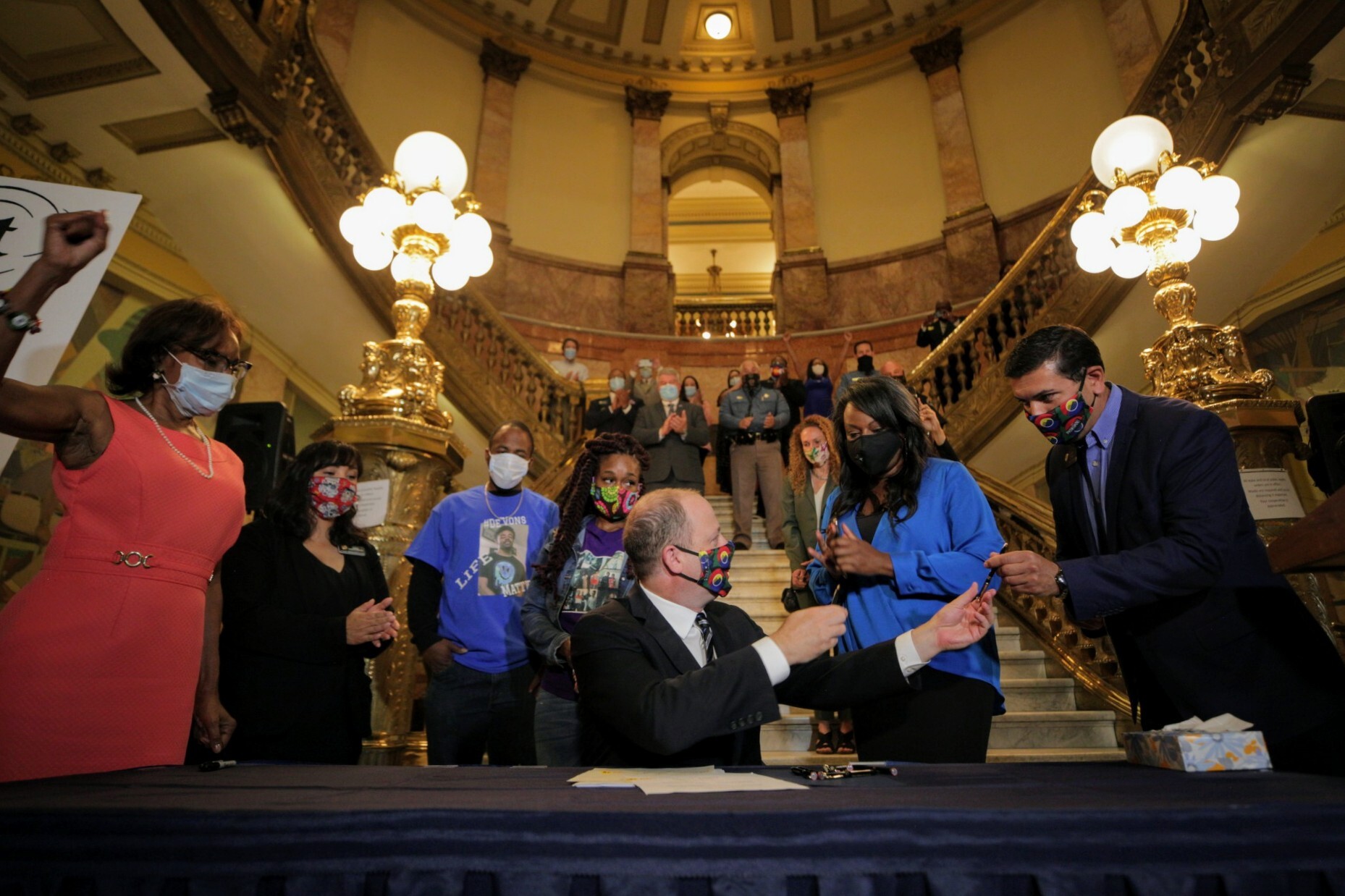
Gov. Jared Polis on Friday signed a broad police accountability bill into law that adds rules about when and how law enforcement can use deadly force, makes it easier for people to sue individual officers and sheriffs deputies, and requires those with a badge to wear a body camera when interacting with the public.
The bill was the most ambitious piece of legislation tackled by state lawmakers during a session cut short by the COVID-19 pandemic. The signing happened against the backdrop of more than two weeks of protests outside the Capitol building against police brutality following the death of George Floyd, a Minneapolis black man who was killed in police custody last month.
It drew bipartisan support in both chambers and was supported by prosecutors and defense attorneys.
“We cannot wait any longer to knock down institutional racism,” Polis said, flanked by lawmakers and families of people who have died at the hands of police at a ceremony at the state Capitol. “This legislation specifically contains landmark evidence-based reforms that not only protect civil rights, but will help restore trust between law enforcement and the communities they serve.”
Even sheriffs, police chiefs and the police union didn’t oppose the legislation — saying in a statement they wished they would have won a few more amendments, but they “recognize social justice holds an important place in our society, including policing. Senate Bill 217 is an example of a collaborative process to help ensure justice and policing in Colorado is transparent and fair.”
Democratic state Sen. Rhonda Fields, whose son was murdered by two men in 2005, said on Friday she knows what it’s like to lose a loved one violently and she wanted to remember victims of police brutality and violence.
“I know your pain and I know what strength it takes to stand on your grief to seek justice on behalf of your loved one,” Fields said. “To the citizens of Colorado who came out and here in protest, I want you to know that we heard your cry and the people of Colorado did not look away.”
The new law gets rid of the state’s “fleeing felon” statute, which made it legal for police to shoot someone running away if they were suspected of a felony and were known to have a weapon. The law received intense scrutiny after the death of De’Von Bailey, a Colorado Springs teenager who was shot and killed last summer by police after he ran away during an arrest for an alleged armed robbery.
“I think it’s important we abolish this today because the fleeing felon law has vestiges in slavery and Jim Crow,” said Democratic state Rep. Leslie Herod, noting Friday’s Juneteenth holiday.
Colorado ranks fifth in the country for the rate of fatal officer-involved shootings per population, a CPR News investigation found earlier this year. Those shootings justified only under the fleeing felon statute were low, though, at 4 percent of the 309 shootings over six years.
The new law also raises the standard for when officers can use deadly force against a suspect — officers must show proof the person was putting either the officer at risk or the community at risk before they shoot someone.
It will now be up to district attorneys to apply the law’s new standards against the actions of law enforcement officers, and prosecutors have traditionally given officers who claim a reasonable fear for their lives or a threat to the community-wide latitude to decide when to use deadly force.
But officers will be required now to report to state officials every time they use force, lethal and non-lethal, against people, including the perceived race of the suspect. And the attorney general has more authority to investigate police departments if there is a disturbing pattern or practice.
“Law enforcement, for too long, has been able to target communities of color without retribution, without accountability and unfortunately for some without the integrity we expect,” Herod said. “The presence of blackness is a threat to too many and it should never be an excuse to kill someone.”
The new law takes effect immediately — though police departments have some time to get the reporting requirements to the Division of Public Safety. At least 20 agencies aren’t using body-worn cameras and will have to purchase them by 2023.









